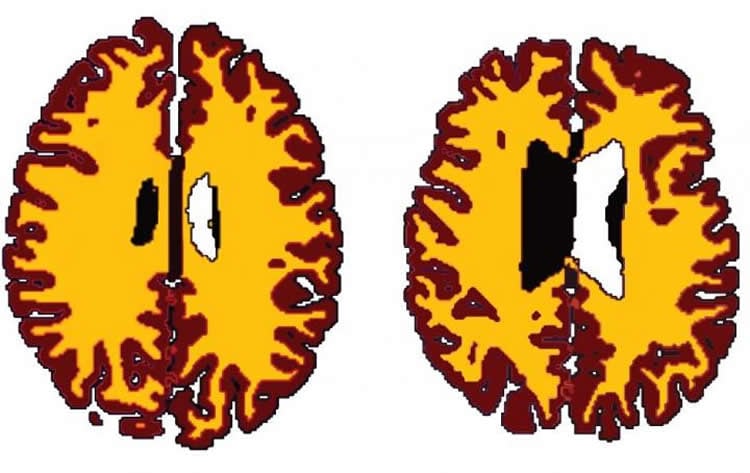Summary: Overweight people have a widespread reduction of their white matter compared to their leaner counterparts of the same age, a new study reports.
Source: University of Cambridge.
From middle-age, the brains of obese individuals display differences in white matter similar to those in lean individuals ten years their senior, according to new research led by the University of Cambridge. White matter is the tissue that connects areas of the brain and allows for information to be communicated between regions.
Our brains naturally shrink with age, but scientists are increasingly recognising that obesity – already linked to conditions such as diabetes, cancer and heart disease – may also affect the onset and progression of brain ageing; however, direct studies to support this link are lacking.
In a cross-sectional study – in other words, a study that looks at data from individuals at one point in time – researchers looked at the impact of obesity on brain structure across the adult lifespan to investigate whether obesity was associated with brain changes characteristic of ageing. The team studied data from 473 individuals between the ages of 20 and 87, recruited by the Cambridge Centre for Aging and Neuroscience. The results are published in the journal Neurobiology of Aging.
The researchers divided the data into two categories based on weight: lean and overweight. They found striking differences in the volume of white matter in the brains of overweight individuals compared with those of their leaner counterparts. Overweight individuals had a widespread reduction in white matter compared to lean people.
The team then calculated how white matter volume related to age across the two groups. They discovered that an overweight person at, say, 50 years old had a comparable white matter volume to a lean person aged 60 years, implying a difference in brain age of 10 years.
Strikingly, however, the researchers only observed these differences from middle-age onwards, suggesting that our brains may be particularly vulnerable during this period of ageing.
“As our brains age, they naturally shrink in size, but it isn’t clear why people who are overweight have a greater reduction in the amount of white matter,” says first author Dr Lisa Ronan from the Department of Psychiatry at the University of Cambridge, “We can only speculate on whether obesity might in some way cause these changes or whether obesity is a consequence of brain changes.”

Senior author Professor Paul Fletcher, from the Department of Psychiatry, adds: “We’re living in an ageing population, with increasing levels of obesity, so it’s essential that we establish how these two factors might interact, since the consequences for health are potentially serious.
“The fact that we only saw these differences from middle-age onwards raises the possibility that we may be particularly vulnerable at this age. It will also be important to find out whether these changes could be reversible with weight loss, which may well be the case.”
Despite the clear differences in the volume of white matter between lean and overweight individuals, the researchers found no connection between being overweight or obese and an individual’s cognitive abilities, as measured using a standard test similar to an IQ test.
Co-author Professor Sadaf Farooqi, from the Wellcome Trust-Medical Research Council Institute of Metabolic Science at Cambridge, says: “We don’t yet know the implications of these changes in brain structure. Clearly, this must be a starting point for us to explore in more depth the effects of weight, diet and exercise on the brain and memory.”
Funding: The research was supported by the Bernard Wolfe Health Neuroscience Fund, the Wellcome Trust and the Biotechnology and Biological Sciences Research Council.
Source: Auriel Willette – University of Cambridge
Image Source: This NeuroscienceNews.com image is credited to Lisa Ronan.
Original Research: Full open access research for “Obesity associated with increased brain-age from mid-life” by Lisa Ronan , Aaron F. Alexander-Bloch, Konrad Wagstyl, Sadaf Farooqi, Carol Brayne, Lorraine K. Tyler, Cam-CANe, and Paul C. Fletcher in Neurobiology of Aging. Published online July 27 2016 doi:10.1016/j.neurobiolaging.2016.07.010
[cbtabs][cbtab title=”MLA”]University of Cambridge. “Brains of Overweight People ‘Ten Years Older’ Than Leaner Counterparts in Middle Age.” NeuroscienceNews. NeuroscienceNews, 4 August 2016.
<https://neurosciencenews.com/weight-brain-aging-neuroscience-4778/>.[/cbtab][cbtab title=”APA”]University of Cambridge. (2016, August 4). Brains of Overweight People ‘Ten Years Older’ Than Leaner Counterparts in Middle Age. NeuroscienceNews. Retrieved August 4, 2016 from https://neurosciencenews.com/weight-brain-aging-neuroscience-4778/[/cbtab][cbtab title=”Chicago”]University of Cambridge. “Brains of Overweight People ‘Ten Years Older’ Than Leaner Counterparts in Middle Age.” https://neurosciencenews.com/weight-brain-aging-neuroscience-4778/ (accessed August 4, 2016).[/cbtab][/cbtabs]
Abstract
Obesity associated with increased brain-age from mid-life
Common mechanisms in aging and obesity are hypothesized to increase susceptibility to neurodegeneration, however direct evidence in support of this hypothesis is lacking. We therefore performed a cross-sectional analysis of MRI-based brain structure on a population-based cohort of healthy adults. Study participants were originally part of the Cambridge Centre for Ageing and Neuroscience (Cam-CAN) and included 527 individuals aged 20 – 87 years. Cortical reconstruction techniques were used to generate measures of whole brain cerebral white matter volume, cortical thickness and surface area. Results indicated that cerebral white matter volume in overweight and obese individuals was associated with a greater degree of atrophy, with maximal effects in middle-age corresponding to an estimated increase of brain-age of 10 years. There were no similar BMI-related changes in cortical parameters. This study suggests that at a population level, obesity may increase the risk of neurodegeneration.
“Obesity associated with increased brain-age from mid-life” by Lisa Ronan , Aaron F. Alexander-Bloch, Konrad Wagstyl, Sadaf Farooqi, Carol Brayne, Lorraine K. Tyler, Cam-CANe, and Paul C. Fletcher in Neurobiology of Aging. Published online July 27 2016 doi:10.1016/j.neurobiolaging.2016.07.010






